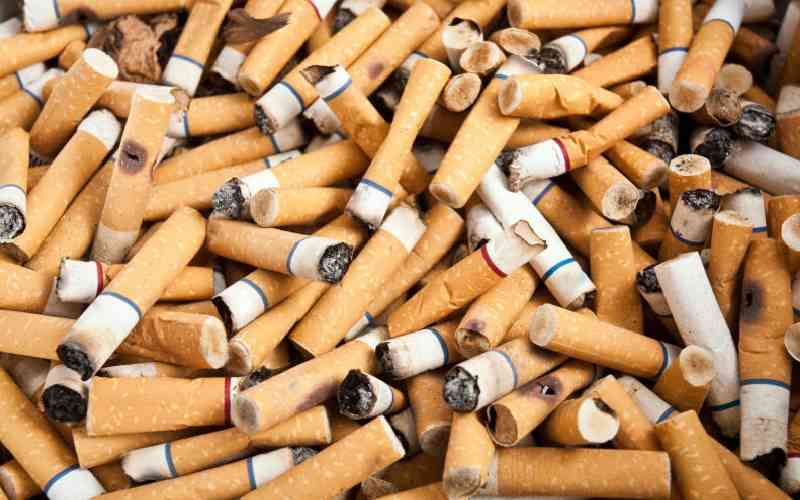
Some 4.5 trillion cigarette butts are discarded globally each year, making them the leading item that litters the earth, according to the United Nations.
But whether dropped on the sidewalks, flicked onto beaches, or tossed in the fields, many of the tiny, lightweight butts end up in water bodies, swept there by water systems or rainfall.
"Many people don't understand the interconnection between all the planet's water systems," said Brian Ngao, an environmental planning and management consultant. "Even if trash such as cigarette butts are not tossed on the beach or off the side of a boat, the rainfall and water networks will ensure that the cigarette remains find their way into rivers and eventually the ocean."
Tobacco's side effects are well documented. The sticks contain over 4000 harmful chemicals which can cause cancer, cardiovascular and chronic lung disease, diabetes and eventually gory teeth.
By comparison, the public is less aware of the damage cigarette filters cause to our environment and health.
And where tobacco chokes a smoker's lungs, cigarette butts choke the earth. Specifically, the ocean and life within it. Yet, a walk along Kenya's 536-kilometre coastline will reveal that cigarette butts are the most found waste product.
Ocean Conservancy, a non-profit organisation that organises beach and waterway cleanups around the globe, reported a collection of 2,416,151 cigarette butts during their 2018 worldwide coastal cleanup.
"On beaches where smoking is allowed, cigarette butts persist as the most found waste product. Unfortunately, they have the most significant impact on marine life," says Dave Ojay, an environmentalist and advocate for sustainable living. "The remains contain harmful chemicals that leek into water, and fish can swallow them."
According to Ojay, most people don't know that cigarette filters are made of plastic fibres, called cellulose acetate.
"Many people assume that the mesh inside a cigarette butt is cotton, but they are plastic fibres," said Ojay. "When these fibres are tossed, they pose a whole new range of danger to the environment, including leaking toxic substances into our water bodies. We even end up ingesting them indirectly."
The cigarette butt pollution raised so much concern around the world prompting countries to impose regulations on cigarette manufacturing and disposal.
Spain, for example, banned smoking on their beaches and imposed a fine of up to Sh242,463. To human life, cigarette butts are a menace too. Plastics don't biodegrade, they photodegrade, meaning that light breaks them into microplastics that hang around our environment, including in the air we breathe.
An article published by the Guardian in April 2022 revealed that plastic particles were found in 11 out of 13 lung samples analysed.
It said that people were already known to consume these particles via food and water. But now, the samples revealed tiny plastics lodged deep in the lungs of living people, meaning they travel down people's airways. Workers exposed to high levels of microplastics are also known to have developed lung disease.
The study also detected microplastics in human blood for the first time in March, showing that particles can move around the body and may lodge in organs.
The impact on health remains unknown. Scientists are however concerned that microplastis could damage human cells as observed in laboratory experiments.
What solutions remain?
Should cigarettes be banned altogether? The standard answer from a doctor is simply never smoke a single cigarette. But like any warning given to humans since the beginning of time, that is improbable.
British American Tobacco among other manufacturers pledged to use 100 per cent recyclable, reusable and combustible materials by 2025 on their cigarettes. For now, BAT have only achieved a 75 per cent mark. The packaging has changed but the cigarette filters remain plastic.
But what if cigarette butts were banned? Would it be better if smokers receded to unfiltered cigarettes? Turns out, it would be a good idea, not just for the fishes but for the smokers too.
Research by scientists revealed that smoking filtered cigarettes could potentially be worse than smoking unfiltered ones. Filters were created to solve one problem; reducing the amount of tar smokers inhale, but created a handful others.
The design and components that make up filters have been proved to alter other properties of smoke and smoking in a way that spikes the risk of lung cancer, researchers say.
 The Standard Group Plc is a multi-media organization with investments in media
platforms spanning newspaper print
operations, television, radio broadcasting, digital and online services. The
Standard Group is recognized as a
leading multi-media house in Kenya with a key influence in matters of national
and international interest.
The Standard Group Plc is a multi-media organization with investments in media
platforms spanning newspaper print
operations, television, radio broadcasting, digital and online services. The
Standard Group is recognized as a
leading multi-media house in Kenya with a key influence in matters of national
and international interest.











